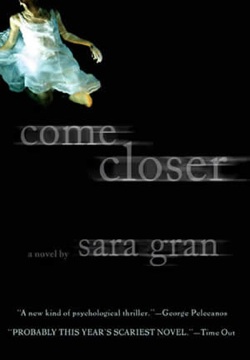
BGH Book Club: Come Closer
Unlike horror movies, horror writing -- be it novels, short fiction, or what have you -- doesn't really have a high powered hype machine to drive consumers to hot new content. In fact, if the part of the web devoted to championing obscure or independent horror movies is a Panzer tank, the part of the web that champions new or rising horror writers is something akin to a stroller full of recyclables being pushed by a decrepit homeless person. Things being as they are, anytime one stumbles onto a piece of criticism about new or interesting horror fiction it feels like X-mas, Hanukkah, and Festivus all rolled into one.
Such was my feeling when I encountered an article titled "Shelley's Daughters" in the NYT Book Review this past October. It was the week before Halloween -- or the one time of year that mainstream outlets can unapologetically trot out horror content -- but the NYT's conceit, which I ended up appreciating, was to discuss the new-ish crop of female horror novelists that had been making waves. The "Shelley" of the article's title was none other than Mary Shelley, who at the tender age of 20 produced one of the finest pieces of horror writing ever put to page: Frankenstein. Jumping off from a discussion of Shelley as the prototypical female horror writer and why, in general, there are not many women who make careers in the genre, Terrance Rafferty discusses four present day writers, and since I couldn't let this embarrassment of riches pass by without some purchases, I picked up a couple of the books that he discusses.
The first of these was Sara Gran's "Come Closer." A trim, economical novel, "Come Closer" clocks in at less than 200 pages, but its size belies a depth of feeling that isn't found in every horror novel. At its core, the book tells the story of Amanda, an architect and all-around striving type who slowly begins to realize that she may be possessed by a demon. The possession leads to the eventual unravelling of Amanda's well-manicured life, but Gran relates the story with enough ambiguity to raise many interesting questions.
Several aspects of "Come Closer" helped it to rise above the level of kitschy possession stories, most of which fail by trying to ape the granddaddy of the genre, "The Exorcist." In "Come Closer" Gran tells her possession story through Amanda's eyes. The first person perspective throws dump-truck-loads of doubt onto virtually everything thing that Amanda says and does. Because all the information must pass through her POV before coming to us, we know that it is polluted by the possessing demon, and we are forced to consider the fact that Amanda may simply be going insane and using her demon fantasy as a convenient explanation for her behavior. To Gran's credit, this question is left open, which allows the reader to evaluate the behavior of other characters in relationship to what we know about Amanda, and what we believe about her condition.
Gran also does an excellent job of providing nuance and context to Amanda's struggle by giving the possessing demon a specific name and backstory. Drawn from Jewish mysticism, the demon Naamah acts as a counter-point to the relatively buttoned-up life that Amanda has cultivated. Naamah is a succubus, and as such she also provides a device through which Gran can explore questions of sexuality and sexual roles through the safety of genre fiction. The manner in which Amanda's life rapidly devolves as her sexual appetite increases and she rejects the seemingly-happy monogamy of her marriage makes clear and unambiguous statements about how Gran sees the world.
However, layered as this exploration of sexuality is within the context of a first person narrative, "Come Closer" becomes an unnerving and subversive jaunt. Gran's prose -- which tends toward efficiency -- helps to foster this ambiance. There is not a lot of wasted space, and Gran allows short, effective description to flower in the mind of the reader. While fans of more gritty, descriptive horror may not get the same visceral stimulation as they might find in other books, "Come Closer" does an excellent job of taking readers into the mind of a woman under siege, and the feelings of claustrophobia and helplessness should prove horrifying to anyone.
Next time at the BGH Book Club: The Keeper.

